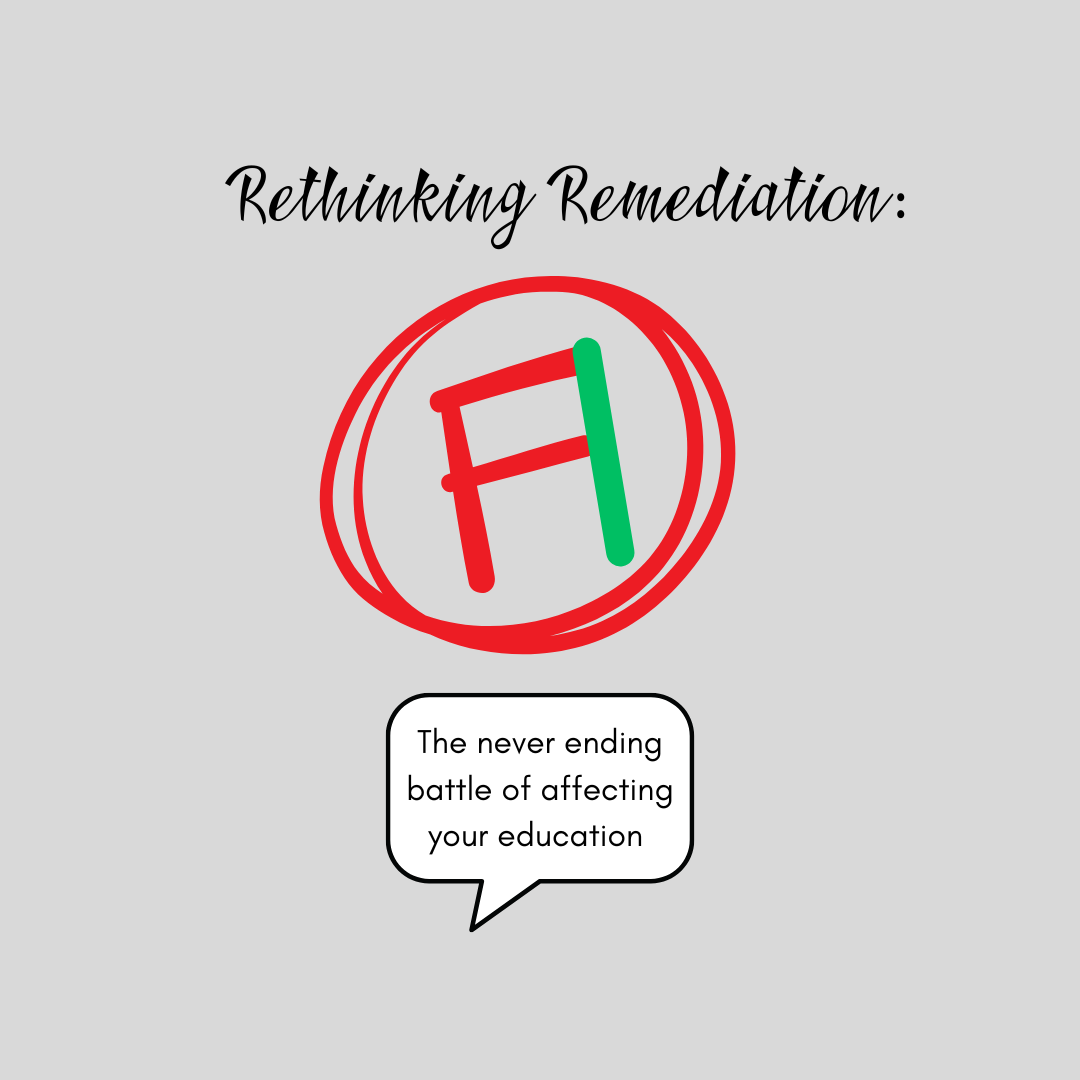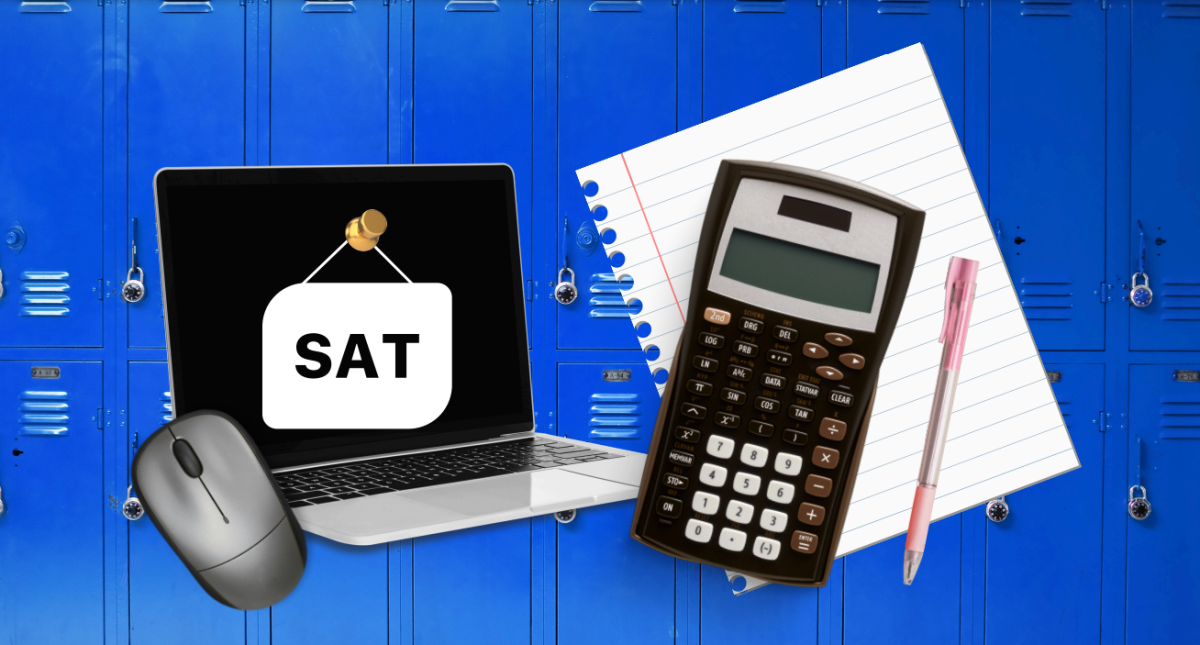Against remediation
Jansher Malik
For students who do not receive the grade they like on a test, remediation is an easy option to get those points back.
The idea behind remediation seems like a useful tool; it gives students a second chance to improve their grades and learn from their mistakes. In reality, though, remediation has become a loophole for students to boost their grades without truly understanding the material. Remediation allows students to repeat the cycle of minimal effort by relying on remediation as a crutch instead of taking responsibility for their learning.
Under the current policy, students can fail a test, fill out a form, attend a brief remediation session, make up any work, and then retake the test. Students then often earn a much higher score without significantly improving their understanding.
A flawed system has been created where grades reflect a student’s ability to take advantage of the policy rather than their mastery of the content. If students can easily remediate, then there is no need to study hard the first time when they know they can simply try again.
This isn’t just a one-time issue. Students can use remediation multiple times throughout a semester, treating it like a safety net. If a student bombs one test, then no problem, they can remediate and retake it. If they bomb another, they have the same solution. For some, this becomes a strategy to pass classes without actually learning.
Additionally, remediation prioritizes grades over knowledge. Students who truly worked hard the first time are left wondering why their effort is devalued, as other students achieve similar grades through repeated retakes. This isn’t just unfair, it’s discouraging.
However, there can be a solution if the school adds more rules to the remediation policy. The school should implement stricter limits on how often remediation can be used. For instance, teachers should allow only one remediation opportunity per semester. It will make remediation a rare privilege rather than a default option. As a result, students will be encouraged to take their initial attempts at tests seriously.
Currently, teachers often create tests very similar to the original. As a result, students who remediate already know what the test is going to be like. Remediation should require students to demonstrate a real commitment to improving, such as completing an entirely new review packet.
Additionally, students need to reevaluate the purpose of grades. Instead of simply replacing a bad test grade with a higher one that is maxed at 90, the original grade and the retake score could be averaged to reflect both the student’s initial struggles and their eventual progress.
The current system of remediation is broken. It enables grade-chasing while undermining the core purpose of education, which is learning. By tightening restrictions and focusing on accountability, it ensures that remediation becomes a tool for genuine growth rather than an easy way out.
For remediation
Kaylee Mague
Learning looks different for everybody. Everyone has different levels of knowledge, and some people just can’t retain information like others. Because of this, remediation is an extremely useful tool to help students boost their understanding of the material at hand.
Although some people do take advantage of remediation, not all students who remediate are ‘bad students’ who do not care enough about the class to do well on the test the first time around.
Many different factors contribute to bad performances on tests such as test anxiety, overthinking, distraction, studying the wrong materials, learning disabilities, and more.
As an AP and honors student myself, I am very familiar with the remediation process. You could ask anyone I know and they will say I take school extremely seriously, yet I still find myself turning in a remediation form after the teacher passes back our tests.
Many people think of remediation as an “easy out” for people who don’t care enough about school, but the majority of the time, remediation is a way for students to look at what they got wrong on the test, evaluate why they made that mistake, fix it, and learn how to prevent making future mistakes like that.
In English classes we have been taught throughout the years that a good writing piece needs to be revised and edited multiple times. This process of growing and reworking essays simply is remediation. The student is taking their work, looking at it, and improving it. If there is a way to do that in English, it should be acceptable to remediate in other content areas as well.
The LHS Student Handbook states, “remediation is the practice of continuous improvement in learning through reassessment, revision, and reflection.”
The whole point behind remediation is for a student to better understand the material at hand. Even students who do take advantage of the remediation system end up leaving with more knowledge than they had the first time they took the test. Sure, they may be retaking the test for a better grade, but regardless of the reason, they are still making an effort to do better. Every student still needs to go over all of the material again, meet with the teacher, and do some kind of work to prove to the teacher they know what they are doing.
There are some classes where remediation only requires a student to look up and fill out the right answers for half points back. Although this is an easy way for students to get a better grade on the test, it is up to the teachers to change their remediation policy if they think they are making retakes too easy.
The student handbook also points out that the process of remediation involves creating an action plan with a specific timeline, meeting with the teacher to identify gaps of knowledge in specific areas of the curriculum, redo formative work or make test corrections to prove a better understanding, and then retake a different version of the test to evaluate growth. If a teacher’s remediation plan does not cover everything the handbook listed, it is up to them to change the plan to best benefit their students, even if it means making a lot more work for the student to complete and the teacher to grade.
It makes sense how some teachers might not favor remediation because having to remake a test is annoying, but if redoing a test is helpful for their student’s growth, then it’s worth it.
A teacher also has the authority to not allow a student to remediate if they have not done any of their formative work in that class. People who truly slack off by not showing up to school or not completing their work on time do not get the privilege of remediation.
Not only can remediation improve understanding and grades, it can also give a student a boost of confidence that will make them feel more comfortable with asking the teacher questions and getting help when stuck. The ability to retest on classroom material allows every student to have a similar level of understanding.
Another way to avoid remediation is for teachers to stick to the content. I’m not saying every teacher does this, but many students have taken a test where some of the content on the test was not a part of the notes materials leading up to the test.
Throwing random hard questions at students will make it more difficult for them to get the question right, so if a teacher sticks to the material they went over in the notes, students can not use this as an excuse for getting a bad grade.
At the end of the day, remediation is a privilege. Teachers have the right to revoke that privilege if a student is not showing they care enough, but remediation should remain an option for students who want to fix their mistakes and learn from them.


















